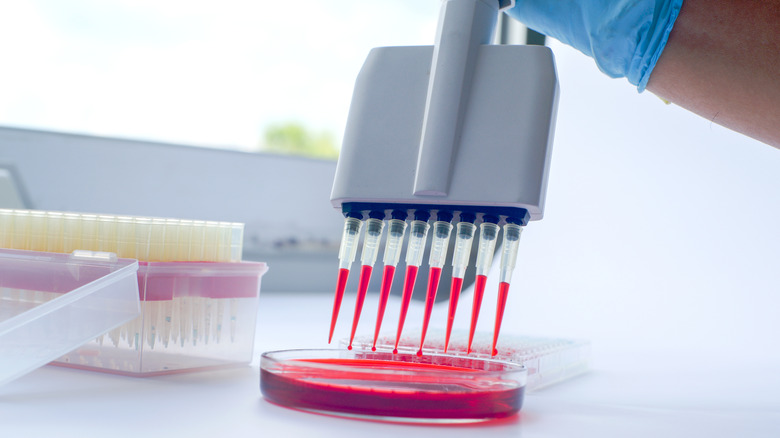Study Finds How New Blood Test Could Make Diagnosing Alzheimer's Easier
Some memory loss is considered a normal part of aging. However, its level of severity can be a warning sign of serious issues. As the National Institute on Aging puts it, forgetfulness that makes day-to-day life difficult or impairs a person's ability to take care of themself is considered a cause for concern. These could be signs of dementia, which creates difficulty in planning and carrying out complex tasks, according to the Mayo Clinic. However, dementia is more like an umbrella term — it covers the effects of many diseases.
According to the World Health Organization (WHO), the most common of these is Alzheimer's disease. An estimated 60-70% of dementia cases are Alzheimer's cases, per the WHO. This means millions of people are affected by the disease, with several million new cases each year. In the U.S. alone, an estimated six million people currently live with Alzheimer's (via the Alzheimer's Association). That number is expected to more than double by 2050, making testing and treatment vital to the health of aging Americans.
Now, a new study published in the journal Brain is shedding light on how the disease may become detectable earlier in the future.
New biomarker test may detect Alzheimer's sooner
According to the 2022 study published in Brain, researchers from the University of Pittsburgh School of Medicine created a test that looks for biomarkers that have been identified in autopsy results from Alzheimer's patients. These markers are unique to Alzheimer's and seem to appear across a range of demographics.
Currently, processes such as magnetic resonance imaging (MRI) and positron emission tomography (PET), are used to diagnose Alzheimer's disease, which can be expensive and inaccessible. The new test, developed by the research team led by Dr. Thomas Karikari, tests for blood markers instead. It's a more affordable and widely available testing method, which means more people can access screening before the condition worsens. As Dr. Karikari pointed out in a University of Pittsburgh press release, however, further testing is needed to ensure that populations not often included in medical screenings can be tested through this process.
As a 2019 article in Degenerative Neurological and Neuromuscular Disease states, early detection can help slow or even prevent severe Alzheimer's symptoms in some people. In others, early detection gives them the chance to adjust their lives and careers so they are better prepared for the disease's progression. In all cases, this new form of testing may help make early detection possible.


